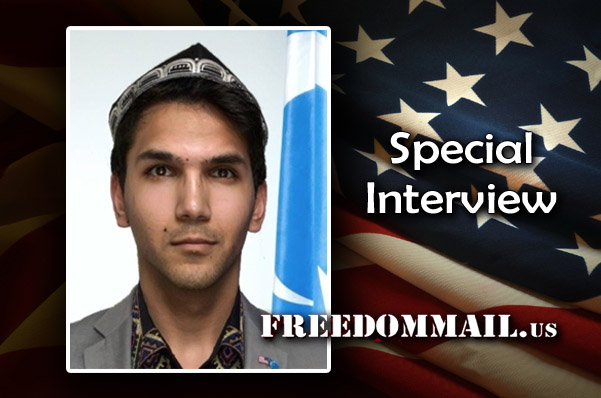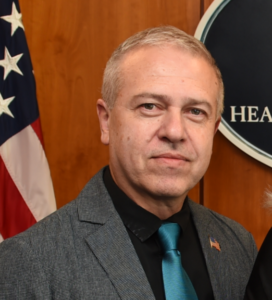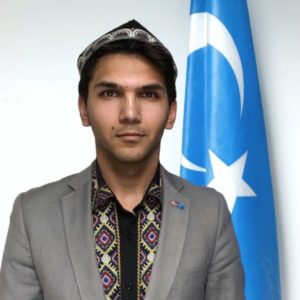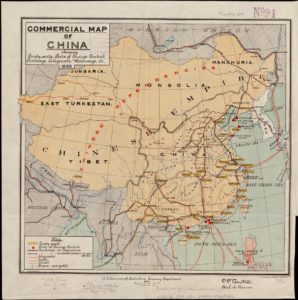A sermon by the seventeenth-century English author, John Donne, implanted the idea that “No man is an island.”
We exist because of others. We depend on others. Our family, our neighbors, our countrymen. Peoples from far away lands all exert influence on our lives.
The great foods of one region, or the music and art from another can all enhance our daily existence. The political ramifications of an imperious regime can have devastating, long term consequences for others on distant continents.
Actions of the Japanese Empire rocked the world with war and death as did Fascist Germany and Italy. Vivid, haunting memories of the Holocaust still ring loud in the consciousness of those affected by the actions of brown-shirted torturers. Times and places we endeavor never to repeat.
Yet one world power with similar behaviors chooses to exert its power over the less fortunate, the defenseless people of one area many have never heard of. And why should Americans be concerned about a remote group of indigenous people thousands of miles away that aren’t currently supplying us with valuable oil, much-needed food resources, or cultural advantages? Because no country is an island. What happens in one area can be a precursor, a silent warning of things to come if preventative awareness and actions aren’t heeded.
One such country is East Turkistan who lives under the inhumane, tyrannical thumb of China. My thanks to its Prime Minister, Salih Hudayar, (bio below), for sharing their story with me and explaining the daily oppressiveness their people live under and how it could affect the world at large. From cultural destruction to camp imprisonment, torture and rapes, and localized nuclear testing, his words should serve as a warning of the many hidden actions and agendas of this Communist enslaver.
Also our thanks to Erbil Gunasti. An insider to the Trump administration, press secretary to 8 Turkish Prime MInisters, and friend of Turkey’s President Erdogan, he shared his insight into the precarious predicament of East Turkistan. You’ll find much more in his recent book “GameChanger: Trump Card: Turkey & Erdogan.”
EG ~ ” In the 21st century, the plight of the Sincan Uyghurs will determine if there will be an Armageddon. In 1991, the disintegration of the Soviet Union handed the independence of Azerbaijan, Kazakhstan, Uzbekistan, Kyrgyzstan, and Turkmenistan. In the ensuing years, the modern Republic of Turkey made its move into Central Asia to embolden and empower these newly freed brethren republics.
After three decades, there are seven Turkic states. Together, they are soon to leverage their newly found union against China, Russia, and India. The goal is to bring Turks and Muslims in the region, dignity, humanity, and modernity that they deserve. No one knows how this will be achieved in the coming decades but for sure with the combined power of the Turkic states, under Turanism, if other overtures do not bring desired results.
China fears it. So does Russia. And no less India: Turanism is nothing to look forward to. In the 21st, century, it will surely become the modern version of the Mongol Empire that Genghis Khan built and domineered the world. Turanism with its faith to its race and religion, coupled with the fraternization of the sizeable portion of Muslims from Asia to Africa will become a formidable threat even to the combined power of Russia, India, and China, if it ever materializes because of fractures between them.
RB ~ The indigenous Uyghurs (pron. You-gers) have roots in the region as descendants of the ancient Sogdian traders. The Uyghurs are an urban people who settled in the oasis towns of the Silk Road – the main trade route between China and Russia. For many centuries, your area of the world was a relatively peaceful, independent nation. How did your geographic area, your nation, come to be, and then in the 1700s and 1800s things changed. Can you explain the major shift in your country’s structure then?
SH ~ East Turkistan has been home to Turkic and Indo-European peoples, whom the Uyghurs are the hybrid descendants. For much of the course of history, East Turkistan had maintained its independence. Our country has been known as Turkistan since the 5th century. However, in 1705 with the fall of the Yarkent Khanate, we became a vassal state to the Manchu Empire. Due to the Great Power competition between the British and Russian Empires in the 19th century, East Turkistan became encroached by three empires: the Manchu Empire in the East, the Russian Empire in the north and west, and the British Empire in the South. East Turkistan was ultimately invaded by the Manchus in 1876, with the financial support of the British, to prevent the Russian Empire from overtaking East Turkistan as it had already occupied the Ili Basin (Yetesu) since 1871. In 1884, the Manchu Qing Empire was fully able to conquer all of East Turkistan and East Turkistan was incorporated into the Manchu Empire as “Xinjiang” meaning the “New Territory.” The Manchus would ultimately start the colonization of East Turkistan and work to alter the demographics of East Turkistan. On November 12, 1933, the Uyghurs, Kazakhs, Kyrgyz, Uzbeks, and other peoples of East Turkistan united and declared independence as the East Turkistan Republic which lasted until April 16, 1934, when the Soviets and Chinese armies invaded and overthrew our Republic. Ten years later on November 12, 1944, the people of East Turkistan declared independence once more as the East Turkistan Republic and maintained our independence until the Chinese Communists invaded and occupied East Turkistan with the help of the Soviet Union, and officially lost our independence on December 22, 1949.
RB ~ Xinjiang (the New Territory or Frontier) has had many controlling groups including of course the Chinese but also the Russians. Does this cause any dramatic changes in the culture, or society in general or do the Uighurs maintain a steady connection to their past?
SH ~ For much of its history, East Turkistan has been controlled by the local Indo-European and Turkic tribes and kingdoms who are predecessors of the current Uyghurs and other Turkic peoples. Despite brief periods of foreign occupation, the overall culture and demographics of East Turkistan remained unchanged until after the Chinese Communist invasion and occupation of East Turkistan in late 1949. In fact, prior to the Chinese Communist occupation, over 90% of East Turkistan’s population where Turkic peoples, whom the majority were Uyghurs. Less than 5% of the population was Chinese, and that Chinese population at the time consisted mostly of Chinese soldiers and their families. It is the Chinese colonists who are the minorities in East Turkistan. However, due to the mass internment of over 3 million Uyghurs, Kazakhs, Kyrgyz, Uzbeks, and Tatars in concentration camps with millions more in prisons, along with a wholesale attack on Turkic culture, identity, and existence, combined with the mass migration of Chinese colonists. Today, however, after 70 years of colonization and occupation, the Turkic peoples of East Turkistan, especially the Uyghurs, are at a risk of becoming a minority in their own land. The Turkic people of East Turkistan account for 55% to 60% of East Turkistan’s population today.
RB ~ You’re the Prime Minister of East Turkistan yet living “in exile.” Where you elected to the post and are you under threats if you return? How are other government officials dealing with this oppression?
SH ~ Officially founded in 2004, the East Turkistan Government in Exile is a democratically elected official body that represents East Turkistan and its people. I was elected as Prime Minister on November 11, 2019 at the ETGE’s 8th General Assembly in Washington, DC. I have constantly received numerous threats from China and its agents, I haven’t been able to contact my family in East Turkistan since the summer of 2017 due to my political activism and the Chinese government’s increasing harassment of my relatives. I have over 100 relatives that have been detained and sent to concentration camps and prisons since 2017 alone. I won’t be able to return until the time has come to formally declare East Turkistan’s independence. Other members of our governments are facing similar oppression, in fact our Vice-President’s two young children were killed by Chinese officials after he refused to cooperate with them. There is always a threat from China but it’s a threat that is upon our entire nation.
RB ~ Was it inevitable and unavoidable that the Chinese Manchu Empire would invade and occupy this once independent country?
SH ~ The Great Power competition between the Russian and British Empire in the 19th century greatly endangered East Turkistan’s survival as an independent nation and despite our leaders trying to balance our relations with these two empires, we ultimately were invaded by the Manchu Empire with the financial backing of the British Empire and became a buffer zone between the British and Russian Empires.
Why Care About a Country?
RB ~ What influences and changes did China exert over this once-peaceful civilization of about 20+ million indigenous people? Are the Uyghurs’ basic civil, religious, cultural rights being taken away?
SH ~ In 1931 it was estimated that East Turkistan’s population was 6-8 million, in 1947 the East Turkistan Republic declared that the Turkic peoples of East Turkistan accounted for over 7 million. Today, we estimate that the Uyghur and other Turkic peoples (Kazakhs, Kyrgyz, Uzbeks, and Tatars) in East Turkistan account for about 35 million people. The basic civil rights, religious, cultural, and human rights of all the Turkic peoples, including the Uyghurs, in East Turkistan have ultimately been eroded, especially post 2016.
Our thanks to the Prime Minister for his input, and in parts 2 and 3 we look at Chinese abuses of the people, their prison camps, and also their nuclear and biological testing.
What happens in other countries should be a warning to the U.S. as to the hidden agendas and future overt actions of an oppressor. An admonition, a prediction of what we could face here should we not take steps to halt their abuses, or protect ourselves.
For more information on the ETGE visit their site: https://east-turkistan.net/ or the UNPO: https://nationalawakening.org/
Salih Hudayar is an Uyghur American activist born in East Turkistan and raised in Oklahoma. He is the Founder of the East Turkistan National Awakening Movement (ETNAM). He was recently elected as the Prime Minister of the East Turkistan Government-in-Exile (ETGE) in November 2019 and is currently pursuing a Masters in National Security Studies at the American Military University. You can follow him on Twitter @SalihHudayar.
#
For updates follow @VideoRon on Twitter
© 2020 Group AMC, Inc.





Recent Comments